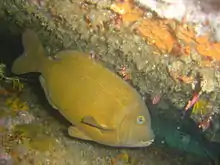| Gymnocrotaphus | |
|---|---|
 | |
| Janbruin at Whittle Rock | |
| Scientific classification | |
| Domain: | Eukaryota |
| Kingdom: | Animalia |
| Phylum: | Chordata |
| Class: | Actinopterygii |
| Order: | Spariformes |
| Family: | Sparidae |
| Genus: | Gymnocrotaphus Günther, 1859 |
| Species: | G. curvidens |
| Binomial name | |
| Gymnocrotaphus curvidens Günther, 1859 | |
Gymnocrotophus curvidens, the Janbruin, is a species of marine fish in the seabream family (family Sparidae) of order Perciformes. It is native to the south coast of South Africa.[1][2]
Distribution
Endemic to Southern Africa from Angola to the Tugela River in KwaZulu-Natal. Usually solitary, and not abundant.[1][3]
Description
Described by Albert Günther, in (1859), in the Catalogue of the fishes in the British Museum. Catalogue of the acanthopterygian fishes in the collection of the British Museum. Gasterosteidae, Berycidae, Percidae, Aphredoderidae, Pristipomatidae, Mullidae, Sparidae. v. 1: i-xxxi + 1–524.[4] The etymology of Gymnocrotaphus: from the Greek, gymnos = naked + Greek, krotaphos = front, head.[5]
A robust fish up to 50 cm long, with length 2.25 times depth, and up to 4 kg. Dark brown with blue eyes and blue cast to head. Prominent teeth. The dorsal fin has 10 spines and 11 to 12 rays, Anal fin 3 spines and 9 to 10 rays. Caudal fin is not deeply forked. It has a horizontal groove in the head profile below the eyes.[2][1]
Habitat
Omnivorous, feeds on sea squirts, bryozoans, polychaetes, algae and crustaceans. Usually found on shallow rocky reefs to a depth of 30m, but has been recorded to depths of 80m. Tends to stay close to the reef in crevices and overhangs.[6][1][3]
Economic importance
Caught by shore anglers and spearfishers, with bag limit, prohibited for sale.[6]
Conservation status
IUCN Status: Least concern. This species is considered to be effectively protected by no-take MPAs over its entire distributional range.[6]
References
- 1 2 3 4 Branch, G.M.; Branch, M.L.; Griffiths, C.L.; Beckley, L.E. (2010). Two Oceans: a guide to the marine life of southern Africa (2nd ed.). Cape Town: Struik Nature. ISBN 978 1 77007 772 0.
- 1 2 Smith, J.L.B. (1977). Smith's sea fishes. Cape Town: Valiant publishers. ISBN 0 86884 029 7.
- 1 2 Jones, Georgina (2008). A field guide to the marine animals of the Cape Peninsula. Cape Town: SURG. ISBN 978-0-620-41639-9.
- ↑ Froese, R. and D. Pauly. Editors. (2023). FishBase. Gymnocrotaphus curvidens Günther, 1859. Accessed through: World Register of Marine Species at: https://www.marinespecies.org/aphia.php?p=taxdetails&id=218603 on 2023-08-24
- ↑ "Gymnocrotaphus curvidens Günther, 1859 Janbruin". www.fishbase.se. Retrieved 24 August 2023.
- 1 2 3 "Red List of South African Species". SANBI. December 2000. Retrieved 24 August 2023.